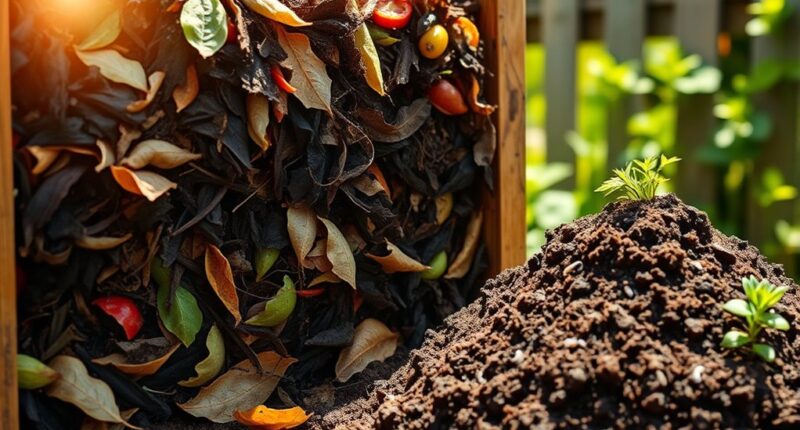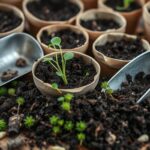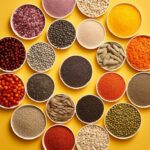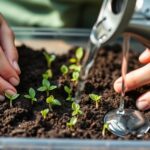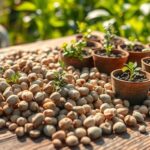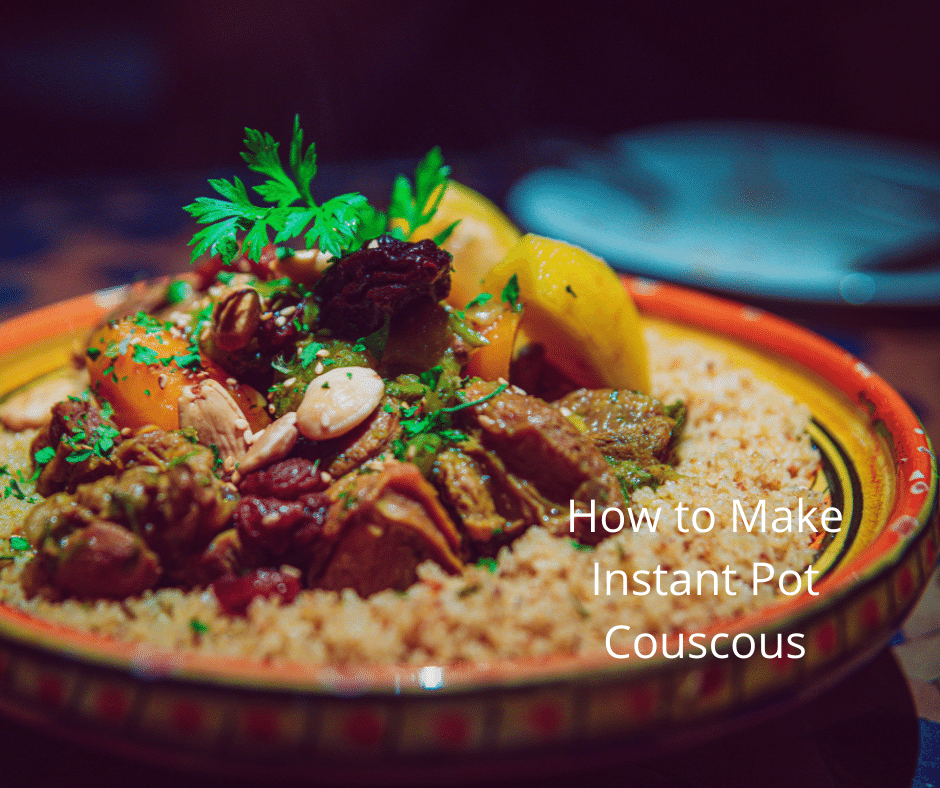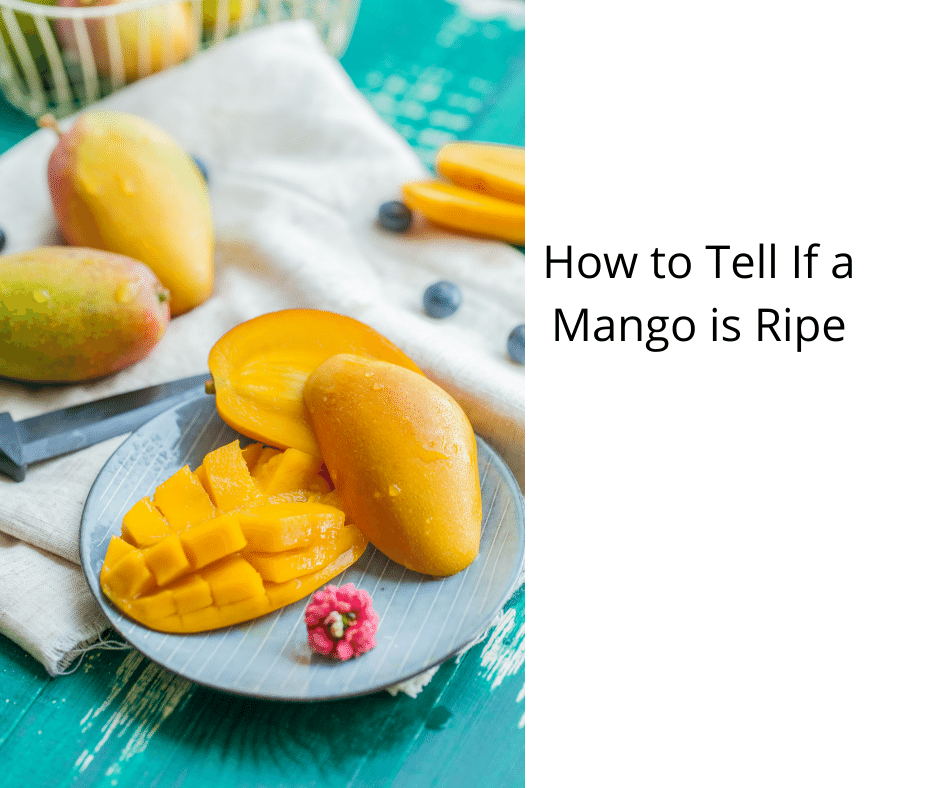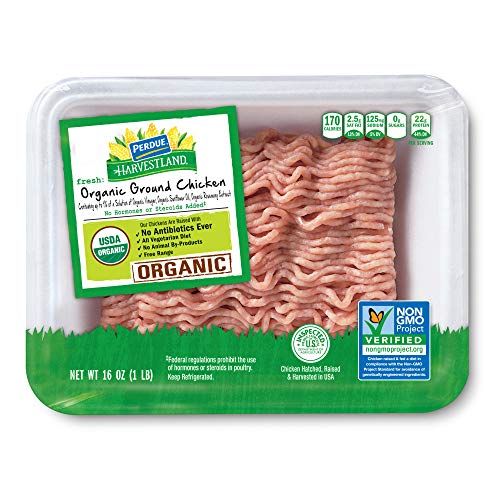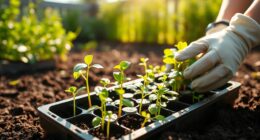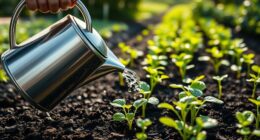To create nutrient-rich soil for seeds, start by composting your kitchen scraps and yard waste using a method suited to your space, like backyard bin, worm composting, or trench composting. Maintain a good balance of greens (veggies, coffee grounds) and browns (leaves, paper), keep the compost moist, and turn it regularly. This process transforms waste into valuable soil, boosting seed growth. Keep exploring to learn how to optimize your compost for the best results.
Key Takeaways
- Use a balanced mix of greens and browns to create nutrient-rich compost ideal for seed-starting soil.
- Maintain proper moisture and aeration by turning the compost regularly to ensure healthy decomposition.
- Choose a composting method suitable for your space, such as bin composting or vermicomposting, to produce quality soil.
- Incorporate kitchen scraps like vegetable peels and coffee grounds to boost nutrient content for seed growing.
- Cover compost piles to prevent pests and maintain consistent moisture levels, enhancing nutrient availability for seeds.

Composting is an easy way to reduce waste and create nutrient-rich soil for your garden. By turning your organic scraps into compost, you give your plants a natural boost and cut down on landfill waste. As a beginner, understanding the different types of composting can help you choose the best method for your space and lifestyle. You might opt for backyard composting, where you set up a bin or pile outside, or consider vermicomposting, which uses worms to break down kitchen waste efficiently. Some people prefer Bokashi, a fermentation process that handles kitchen scraps quickly, while others might try trench or sheet composting directly in the garden. Each method has its own advantages, but they all share the goal of transforming waste into valuable soil amendment.
The benefits of composting go beyond waste reduction. It enriches your soil by adding essential nutrients like nitrogen, phosphorus, and potassium, which promote healthy plant growth. Compost improves soil structure, making it more aerated and better at retaining moisture, so your plants thrive even during dry spells. It also helps suppress plant diseases and pests naturally, reducing your reliance on chemical fertilizers and pesticides. Plus, composting is an environmentally friendly practice that lessens greenhouse gas emissions associated with waste decomposition in landfills. It’s a simple, rewarding activity that supports sustainability and can save you money on store-bought fertilizers.
Getting started with composting is straightforward. You’ll want to gather a mix of “greens” (such as vegetable scraps, coffee grounds, and grass clippings) and “browns” (like dried leaves, straw, or shredded paper). The key is maintaining a good balance between these materials to ensure proper decomposition. Keep your compost moist, but not soaked, and turn it regularly to introduce oxygen, which speeds up the process. If you’re concerned about pests, use a covered bin or secure your pile with a lid. For those with limited space, small tumblers or worm bins work well and can be kept indoors or on a balcony.
Frequently Asked Questions
How Long Does It Take to Produce Compost?
The composting timeline depends on factors like ingredients, moisture, and aeration, but generally, it takes about 3 to 6 months to reach compost maturity. You’ll notice stabilized material, a rich earthy smell, and dark, crumbly texture, indicating your compost is ready. Regular turning speeds up the process, helping you achieve nutrient-rich soil faster. Patience and proper management are key to producing healthy compost efficiently.
Can I Compost Pet Waste Safely?
Think of pet waste disposal like handling a delicate treasure—it’s tempting but risky. Composting pet waste can introduce composting hazards, spreading parasites or bacteria if not done correctly. You shouldn’t compost pet waste in your regular compost bin, as it poses health risks. Instead, consider specialized systems or disposal methods. Protect your soil and health by avoiding composting pet waste unless you’re sure you can do it safely and correctly.
What Are Common Composting Mistakes to Avoid?
You should avoid common composting mistakes like overloading your bin or not balancing greens and browns, which can slow down the process. Don’t believe composting myths that it’s complicated or smelly; understanding the composting benefits proves otherwise. Keep turning your pile and maintaining proper moisture. By steering clear of these errors, you’ll enjoy nutrient-rich soil and successful composting outcomes, making it easier to grow healthy plants and reduce waste effectively.
How Do I Prevent Pests in My Compost Bin?
To prevent pests in your compost bin, you should focus on pest prevention strategies. Keep your compost covered with a tight-fitting lid or a layer of straw to block pests from getting in. Avoid adding meat, dairy, and oily foods, as these attract pests. Turn your compost regularly to aerate it and discourage pests. Also, maintain a balanced mix of greens and browns to keep pests away and promote healthy composting.
Is Composting Suitable for Small Apartments?
Imagine your apartment as a tiny garden where composting becomes a secret tool. Indoor composting is perfect for small apartments, offering apartment-friendly methods like countertop bins or worm farms. These methods turn kitchen scraps into rich soil without taking up much space or causing odors. With a little care, you can create nutrient-rich soil right in your home, transforming your living area into a sustainable oasis.
Conclusion
Now that you’re armed with the secrets of composting, think of your garden as a blank canvas waiting for vibrant life. With each organic scrap you add, you’re planting the seeds of rich, nurturing soil—your garden’s secret potion. Embrace the process, and watch your plants flourish like a symphony of colors and textures. Composting isn’t just a chore; it’s your garden’s heartbeat, turning simple waste into the magical foundation for nature’s masterpiece.
